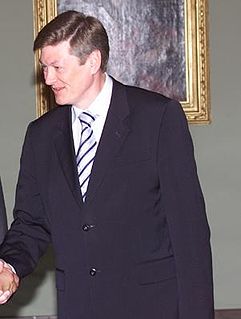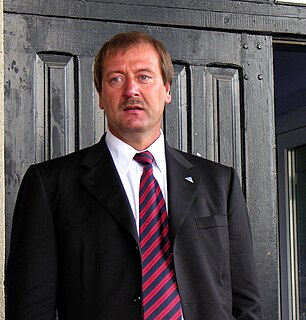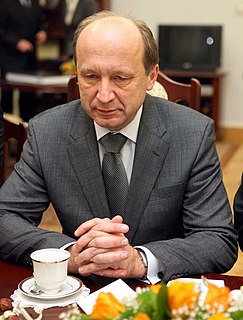| |||||||||||||||||||||||||||||||||
All 141 seats to the Seimas 71 seats were needed for a majority | |||||||||||||||||||||||||||||||||
| |||||||||||||||||||||||||||||||||
| |||||||||||||||||||||||||||||||||
 |
|---|
| This article is part of a series on the politics and government of Lithuania |
| Constitution |
Legislature |
Judiciary |
Parliamentary elections were held in Lithuania on 8 October 2000. All 141 seats in the Seimas were up for election, 71 of them in single-seat constituencies based on first-past-the-post voting; the remaining 70, in a nationwide constituency based on proportional representation. Altogether, around 700 candidates competed in the single-seat constituencies, while over 1,100 candidates were included in the electoral lists for the nationwide constituency. [1]

Lithuania, officially the Republic of Lithuania, is a country in the Baltic region of Europe. Lithuania is considered to be one of the Baltic states. It is situated along the southeastern shore of the Baltic Sea, to the east of Sweden and Denmark. It is bordered by Latvia to the north, Belarus to the east and south, Poland to the south, and Kaliningrad Oblast to the southwest. Lithuania has an estimated population of 2.8 million people as of 2019, and its capital and largest city is Vilnius. Other major cities are Kaunas and Klaipėda. Lithuanians are Baltic people. The official language, Lithuanian, along with Latvian, is one of only two living languages in the Baltic branch of the Indo-European language family.

The Seimas of the Republic of Lithuania, or simply the Seimas, is the unicameral parliament of Lithuania. The Seimas constitutes the legislative branch of government in Lithuania, enacting laws and amendments to the Constitution, passing the budget, confirming the Prime Minister and the Government and controlling their activities.

A first-past-the-post electoral system is one in which voters indicate on a ballot the candidate of their choice, and the candidate who receives the most votes wins. This is sometimes described as winner takes all. First-past-the-post voting is a plurality voting method. FPTP is a common, but not universal, feature of electoral systems with single-member electoral divisions, and is practiced in close to one third of countries. Notable examples include Canada, India, the United Kingdom, and the United States, as well as most of their current or former colonies and protectorates.
Contents
The Social Democratic coalition of former President Algirdas Brazauskas received the largest share of the popular vote in the nationwide constituency (31 per cent) and won the most seats in the Seimas (51 seats), but short of the 71 seats needed for the majority. New Union (Social Liberals), led by Artūras Paulauskas, came second in the nationwide constituency (19.64 per cent), winning 29 seats in the parliament. The centre-right Liberal Union, led by the Mayor of Vilnius and former Prime Minister Rolandas Paksas, became as the largest single party in the parliament, with 34 seats and 17.25 per cent of the vote in the nationwide constituency.

Algirdas Mykolas Brazauskas was the second President of a newly independent post-Soviet Lithuania from 1993 to 1998 and Prime Minister from 2001 to 2006.

The New Union was a social-liberal political party in Lithuania. The NS was a member of the European Liberal Democrat and Reform Party (ELDR) and an observer of the Liberal International. It was founded in 1998 and is led by Artūras Paulauskas.

Artūras Paulauskas[ɐrˈtuːrɐs pɐʊˈɫɐ̂ˑʊskɐs](
The Homeland Union, which had led the government for the previous four years, performed poorly in the elections, receiving only 8.62 per cent of the vote and winning eight seats, down from more than 30% of the vote and 70 seats in the previous elections. Prime Minister Andrius Kubilius and many other prominent ministers were beaten in their constituencies. In the electoral campaign dominated by economic issues, the party was punished by voters for the economic recession and high unemployment, as well as its austerity policy. The Social Democratic coalition, on the other hand, had promised the end to austerity, including lower taxes and higher social spending. [1]
The Homeland Union – Lithuanian Christian Democrats is a centre-right political party in Lithuania. It has 18,000 members and 30 of 141 seats in the Seimas.

Andrius Kubilius is a Lithuanian politician who was Prime Minister of Lithuania from 1999 to 2000 and again from 2008 to 2012. He was leader of the conservative political party Homeland Union – Lithuanian Christian Democrats.













